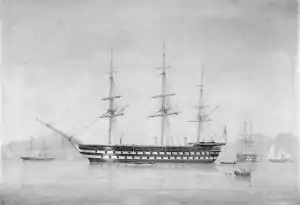Agamemnon-class ship of the line
The Agamemnon-class (sometimes known as the James Watt-class) steam battleships, or steam ships of the line, were a class of five 91-gun steam second rates of the Royal Navy. The original design was produced by John Edye in 1847, as a response to the French Le Napoléon, which was rumoured to be under development.
 HMS James Watt | |
| Class overview | |
|---|---|
| Name | Agamemnon |
| Operators | |
| Preceded by | Princess Royal class |
| Succeeded by | Renown class |
| In service | August 1852 — 1904 |
| Completed | 5 |
| General characteristics | |
| Type | Steam Ship of the line |
| Displacement | 4614 long tons |
| Tons burthen | 3085 bm |
| Length |
|
| Beam | 55 ft 4 in (16.87 m) |
| Draught | 23 ft 1 in (7.04 m) |
| Propulsion | Sails & 600nhp steam engine with single screw |
| Sail plan | Full-rigged ship |
| Speed | 11.9 knots (steaming) |
| Complement | 860 officers and men |
| Armament |
|
The first ship of the class, Agamemnon, was originally designed as a two decker, 80 gun sailing ship of the line. But was re-ordered as the first purpose built steam screw ship for the British Navy.[1]
Ships
- Builder: Woolwich Dockyard
- Ordered: 25 August 1849
- Launched: August 1852
- Fate: Sold, 12 May 1870
- Builder: Pembroke Dockyard
- Ordered: 14 January 1850
- Launched: 23 April 1853
- Fate: Sold, 23 January 1875
- Builder: Pembroke Dockyard
- Ordered:
- Launched: 27 September 1855
- Fate: Sold, 1898
- HMS Edgar
- Builder: Woolwich Dockyard
- Ordered:
- Launched: 23 October 1858
- Fate: Sold, 1904
- HMS Hero
- Builder: Chatham Dockyard
- Ordered:
- Launched: 15 April 1858
- Fate: Sold, 20 June 1871
References & Citations
- Lambert, Andrew (1984) Battleships in Transition: The Creation of the Steam Battlefleet 1815–1860. Conway Maritime Press. ISBN 0-85177-315-X.
References
- Winfield, Rif (2014). British Warships in the Age of Sail 1817-1863: Design, Construction, Careers and Fates. Seaforth Publishing. ISBN 9781848321694.
This article is issued from Wikipedia. The text is licensed under Creative Commons - Attribution - Sharealike. Additional terms may apply for the media files.